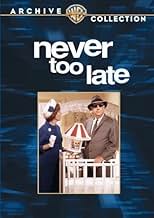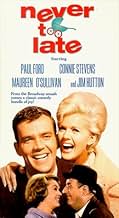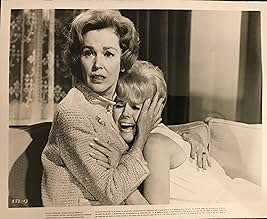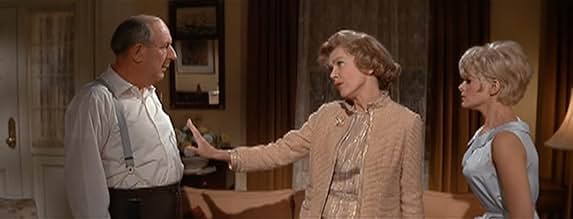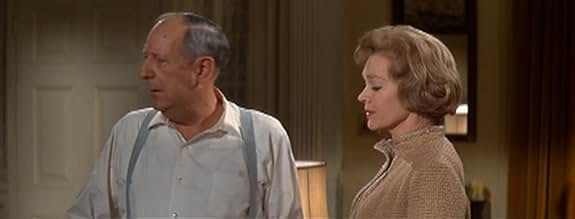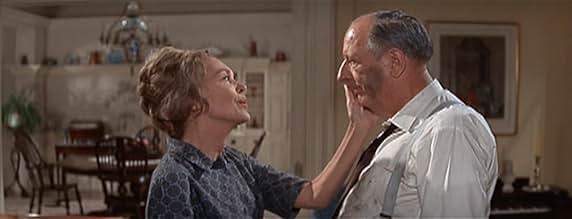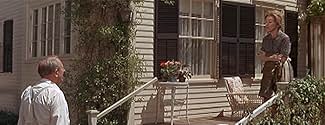Fünfzig-etwas Edith Lambert ist begeistert zu erfahren, dass sie ein Baby bekommen wird. Ihr Mann Harry ist jedoch weniger begeistert.Fünfzig-etwas Edith Lambert ist begeistert zu erfahren, dass sie ein Baby bekommen wird. Ihr Mann Harry ist jedoch weniger begeistert.Fünfzig-etwas Edith Lambert ist begeistert zu erfahren, dass sie ein Baby bekommen wird. Ihr Mann Harry ist jedoch weniger begeistert.
- Auszeichnungen
- 1 Nominierung insgesamt
Michael Abelar
- Lumberyard Man
- (Nicht genannt)
Lou Bernard
- Lumberyard Man
- (Nicht genannt)
Robert Biheller
- Young Husband
- (Nicht genannt)
Ted Blair
- Lumberyard Man
- (Nicht genannt)
Gino Cappelletti
- Lumberyard Man
- (Nicht genannt)
Charles Dornan
- Surveyer
- (Nicht genannt)
Johnny Eimen
- Boy
- (Nicht genannt)
Tommy Farrell
- Fred Ainsley
- (Nicht genannt)
Jesslyn Fax
- Saleswoman
- (Nicht genannt)
Pamelyn Ferdin
- Little Girl in Elevator
- (Nicht genannt)
John Francis
- Plumber
- (Nicht genannt)
Empfohlene Bewertungen
Crotchety Harry Lambert (Paul Ford) owns a small lumber yard. He is not happy with his new-thinking employee son-in-law Charlie Clinton (Jim Hutton). He is pushing his daughter Kate (Connie Stevens) to start a family. His wife Edith (Maureen O'Sullivan) receives surprising news. She's pregnant.
It's a fun concept especially for the older couple. It's based on a 1962 play. The younger couple is a little off. They are playing more immature especially Connie Stevens. She's in her late twenties. The character plays more early twenties. Charlie shows that he's forward thinking early on, but he retreats back to the 50's. The younger couple is more annoying than funny. The two couples are far too similar. I kept thinking of Norman Lear doing All in the Family. I like the first half a lot. The second half takes a couple of awkward turns where it could funny but somehow it's not that funny. It becomes a bit too angry without the humor.
It's a fun concept especially for the older couple. It's based on a 1962 play. The younger couple is a little off. They are playing more immature especially Connie Stevens. She's in her late twenties. The character plays more early twenties. Charlie shows that he's forward thinking early on, but he retreats back to the 50's. The younger couple is more annoying than funny. The two couples are far too similar. I kept thinking of Norman Lear doing All in the Family. I like the first half a lot. The second half takes a couple of awkward turns where it could funny but somehow it's not that funny. It becomes a bit too angry without the humor.
Since this film followed a successful Broadway play, I can only conclude that the play must have been funnier. I found Paul Ford's character completely repugnant. He is a blowhard who has no appreciation for anyone around him. This is supposed to be hilarious but I just found it irritating and sad. The idea that a lovely, charming woman like Maureen O'Sullivan would be married to the crude, unattractive Paul Ford strains credulity. Not the fault of the actor - he is very funny in other movies - it is instead the result of the hostile screenplay.
... as this film clearly demonstrates. This is a cute little film about a 50 year old woman (Maureen O'Sullivan) and her 60 year old husband (Paul Ford) who find out they are going to be parents a second time. Their first and only child is a 25 year old married daughter (Connie Stevens) who, along with her 27-year old husband, lives with her parents in their large home. Her husband works for her father in his lumber supply business. This was produced by the team of Norman Lear and Bud Yorkin, and you can't help but feel they were warming up for "All in the Family" with this one, there are so many similarities. The middle-aged wife is named Edith, and prior to the pregnancy being discovered, she is running around the home at a manic pace doing housework. The son-in-law is constantly being kicked around and disrespected by his father-in-law, and the daughter is constantly bursting into tears and becoming hysterical. All that's missing is the social commentary of All in the Family.
Maureen O'Sullivan's character feels a new-found pride and femininity in her condition. Ford's character, however, is embarrassed beyond belief. After all, it proves at their advanced age they're still having sex! What's worse, they live in a small New England town where everyone knows them and stops and stares at them on the street. The grown daughter is unhappy because at the tender age of 25 she has to grow up. Mom is too old to be keeping such a large house in her condition and now it is the daughter's turn to do the cooking, the cleaning, etc. No more sleeping late, handing her dirty laundry to mom, and heading off for an afternoon of tennis. Her solution - if she gets pregnant too, her cheapskate father will have to spring for a paid housekeeper.
Sure, many of the values demonstrated here are quite dated and even sexist, but it's a cute romp with lots of humor, and who would ever have thought that the 60's could be looked back upon with nostalgia as a simpler time. Well, in this film they can be.
Maureen O'Sullivan's character feels a new-found pride and femininity in her condition. Ford's character, however, is embarrassed beyond belief. After all, it proves at their advanced age they're still having sex! What's worse, they live in a small New England town where everyone knows them and stops and stares at them on the street. The grown daughter is unhappy because at the tender age of 25 she has to grow up. Mom is too old to be keeping such a large house in her condition and now it is the daughter's turn to do the cooking, the cleaning, etc. No more sleeping late, handing her dirty laundry to mom, and heading off for an afternoon of tennis. Her solution - if she gets pregnant too, her cheapskate father will have to spring for a paid housekeeper.
Sure, many of the values demonstrated here are quite dated and even sexist, but it's a cute romp with lots of humor, and who would ever have thought that the 60's could be looked back upon with nostalgia as a simpler time. Well, in this film they can be.
Before Bud Yorkin and Norman Leer shot to fame for films such as "Start the Revolution Without Me" or TV shows like "All in the Family", they had a big stage success with "Never Too Late". And, unlike most Broadway shows that make it to the big screen, the starts of the play, Paul Ford and Maureen O'Sullivan, starred in BOTH!
The story is very simple. Edith is in her 50s and finds herself pregnant. However, oddly, her husband just seems to be in a very foul mood throughout the film...complaining about pretty much everything! You'd think he'd be happy and initially shocked...but his reaction just seemed bizarre and inappropriate. And, speaking of inappropriate, when the daughter and her husband hear about it, suddenly the daughter (Connie Stevens) insists she also wants a baby and her husband (Jim Hutton) also then spends the rest of the film complaining! And, after a while, I just got tired of it!
While the story is fun, at least initially, it just didn't seem the least bit realistic nor enjoyable. Yelling isn't comedy...and this is pretty much yelling from start to finish. It has some good moments here and there...but overall it left me flat.
By the way, if you watch the film, notice that they never use the word 'toilet' in the scene with the toilet. They also act as if it's something unmentionable. Too weird.
The story is very simple. Edith is in her 50s and finds herself pregnant. However, oddly, her husband just seems to be in a very foul mood throughout the film...complaining about pretty much everything! You'd think he'd be happy and initially shocked...but his reaction just seemed bizarre and inappropriate. And, speaking of inappropriate, when the daughter and her husband hear about it, suddenly the daughter (Connie Stevens) insists she also wants a baby and her husband (Jim Hutton) also then spends the rest of the film complaining! And, after a while, I just got tired of it!
While the story is fun, at least initially, it just didn't seem the least bit realistic nor enjoyable. Yelling isn't comedy...and this is pretty much yelling from start to finish. It has some good moments here and there...but overall it left me flat.
By the way, if you watch the film, notice that they never use the word 'toilet' in the scene with the toilet. They also act as if it's something unmentionable. Too weird.
This film is a forgettable piece of fluff that's perfectly fine if, say, you're sick in bed and don't have many other options. Paul Ford plays the classic 1960's successful businessman but bumbling husband whose home life is a mess, and Maureen O'Sullivan is his long suffering wife who's gets pregnant in, I don't know, probably her mid- to late-50's. Connie Stevens is their daughter and Jim Hutton is their son-in-law, who bounce back and forth between being supportive and argumentative, whatever each particular scene requires. And apparently, the moral of the film is that political corruption pays off in the end.
If this sounds good to you, then go ahead and tee up this film. But I have to warn you: For the sweet love of all that is holy, fast forward through the horrible, horrible theme song. When I heard the opening theme, I literally started hating the movie already. The same song repeats during the ending credits, so get ready with the kill switch then, too.
If this sounds good to you, then go ahead and tee up this film. But I have to warn you: For the sweet love of all that is holy, fast forward through the horrible, horrible theme song. When I heard the opening theme, I literally started hating the movie already. The same song repeats during the ending credits, so get ready with the kill switch then, too.
Wusstest du schon
- WissenswertesTimothy Hutton, son of Jim Hutton, made his first screen appearance in this movie as the little boy who runs to his father.
- PatzerLate in the movie, after the "drunken fight" scene when Edith tells Harry "it's not true", a portable phonograph (record player) sitting on a table alternates between being crooked on the table and being aligned with the table edge.
- Zitate
Charlie Clinton: A lot of people hate you. What's that got to do with it? Look, if the city needs lumber, it might as well be ours.
Harry M. Lambert: Just what do you mean by a lot of people hate me?
- VerbindungenReferenced in What's My Line?: Maureen O'Sullivan (1965)
- SoundtracksNever Too Late
Music by David Rose
Lyrics by Jay Livingston and Ray Evans
Sung by Vic Damone during the opening credits
Played often in the score
Top-Auswahl
Melde dich zum Bewerten an und greife auf die Watchlist für personalisierte Empfehlungen zu.
- How long is Never Too Late?Powered by Alexa
Details
- Laufzeit
- 1 Std. 45 Min.(105 min)
- Sound-Mix
- Seitenverhältnis
- 2.35 : 1
Zu dieser Seite beitragen
Bearbeitung vorschlagen oder fehlenden Inhalt hinzufügen


